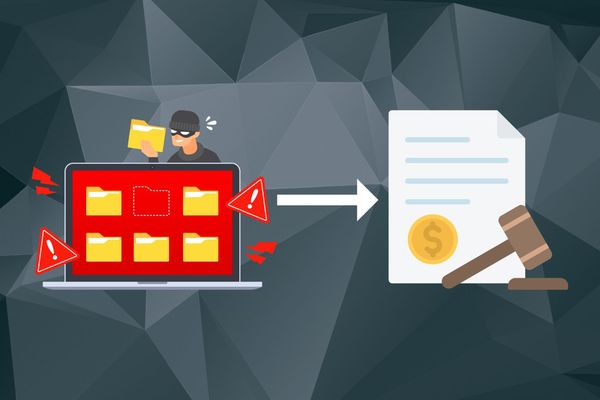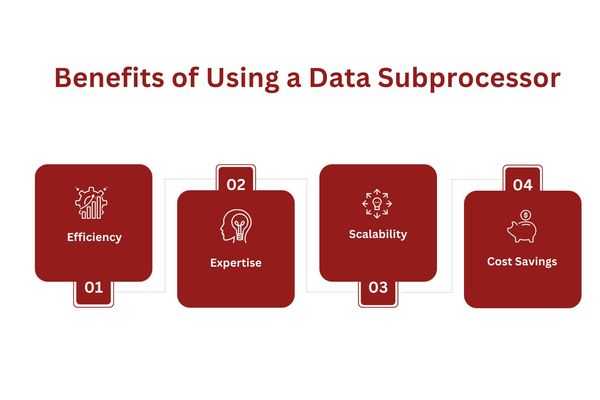
Have you ever come across the term data subprocessor? Well, you’ve come to the right place to find out everything you need to know about data subprocessors.
This article will cover one quiet yet powerful entity – the data subprocessor. We’ll cover what they are, what they do, if they’re liable, and the benefits of using them.
They’re not often talked about, but they play an essential role within the digital landscape and hold more influence than we can imagine.
Key Takeaways
Data subprocessors play a role in assisting businesses by organizing, safeguarding, and managing personal data. They are an extension of GDPR’s two roles (Data controllers and processors).
Any errors made by a subprocessor will make the businesses or processors liable, as they are ultimately accountable.
When it comes to navigating the landscape of data privacy regulations and GDPR guidelines, choose Captain Compliance as your trusted guide. We will work diligently to ensure that everything remains in compliance and order.
What is a Data Subprocessor?
What is a Data Subprocessor.jpg

A data subprocessor functions as an assistant that businesses rely on to organize and handle their data effectively.
The processor requires the controller’s approval to use a sub-processor. This permission and its terms are outlined in their data processing agreement (DPA). Once approved, the processor must form an agreement with the sub-processor that is compliant with Article 28(3) of GDPR regulations.
They play a role in supporting the main business by taking care of specific data-related tasks. Think of them as a trusted companion whom you can rely on when it comes to organizing your data.
Businesses deal with a vast amount of information that requires management. This includes all sorts of data, such as consumer names, purchase records, addresses, and other data subject details. Handling personal data and ensuring data protection can be quite challenging. This is where third-party data subprocessors come into play.
The business, or the personal data controller, assigns their responsibilities to assist in managing this information. For instance, let’s consider a business that provides tools for teams. They collaborate with businesses to help manage their data efficiently.
Pro tip: the data controller should only give the necessary information to the data subprocessor to remain compliant with the compliance laws.
What Does a Data Subprocessor Do?
A data subprocessor plays a role as an entity that is an extension of GDPR’s two roles (Data controllers and processors). Their primary responsibility is to organize and safeguard all personal data. While they don’t make decisions about what to do with the data, they diligently execute the tasks assigned to them by the data controller.
Data subprocessors came into existence due to the need for more specialized handling of data in various industries. With growing technological advancements, companies began outsourcing certain aspects like payroll services or customer relationship management systems that involve processing personal data.
To illustrate further, envision yourself organizing a party where you determine the theme, create the guest list, and curate the music playlist.
However, you hire a catering company to handle the food and beverages. They wouldn’t alter your party theme, invite their own guests, or change music without consulting you first – they simply perform their duties based on your instructions. In this analogy, the caterer represents the data subprocessor.
They don’t make decisions regarding GDPR compliance details and data protection details. In the realm of data management, these subprocessors have roles to fulfill.
They may securely store and manage information like names and addresses or even sensitive information like SSNs and financial information. They can also assist in analyzing the data for marketing purposes in some cases. Many businesses rely on these subprocessors to ensure the proper handling of their personal data.
Why are they so important? Well, big businesses deal with large amounts of data and analytics that can become overwhelming if managed independently. So, they use these subprocessors for areas of expertise. It’s all about collaboration. Ensuring that personal data is handled properly.
Is the Subprocessor Liable or Are You?
Is the Subprocessor Liable or Are You.jpg

When there are issues with customer personal data, it’s usually the main business or processor that faces liabilities, even if the one who made the mistake was the subprocessor. The main business is on the hook because they decide how the personal data gets used.
The subprocessor just follows their instructions, so if something goes wrong, it’s probably because the business didn’t give good guidance or check the work properly. That doesn’t mean subprocessors can just do whatever they want, though. They still need to follow the rules and do their job right.
But at the end of the day, the main business has to make sure everything is in order since they’re the ones in charge.
So, if you’re a business handling data and trying to protect it, remember – even if you’ve outsourced compliance help, you’re still ultimately responsible for what happens to the data.
Be careful to verify that everything’s done right. It’s always better to be safe than sorry when it comes to people’s customer data!
Benefits of Using a Data Subprocessor
Benefits of Using a Data Subprocessor.jpg

Businesses today have a ton of information flying around all the time. It’s like working in a busy kitchen during the dinner rush.
Now think about having an assistant chef who really understands how to handle all that hustle and bustle, and that’s kind of what a compliance services data subprocessor does for businesses. They jump in to take care of customer information and keep things running smoothly.
So why do businesses love having these data subprocessors on their team so much? Let’s take a look at some of the key benefits they offer:
Efficiency
When using a data subprocessor, all data-related tasks are completed swiftly with little to no work on the business’s side. This means that businesses don’t need to wait for results. Whether it’s organizing consumer names or sending out volumes of emails, subprocessors handle these tasks efficiently.
For businesses, this is incredibly valuable as it allows them to focus on main business tasks. Efficiency goes beyond speed; it also involves getting things on the first attempt. Mistakes can be costly. However, by utilizing an expert subprocessor, the likelihood of errors decreases significantly.
Expertise
Data processors are the experts when handling data because that’s their main job! They possess knowledge and skills in handling data tasks. They excel at understanding customer data, following your specific instructions, and catering to your specific needs.
Their expertise extends beyond knowledge; it encompasses possessing the tools and techniques needed.
Imagine attempting to bake a cake without the ingredients or knowing how to bake the cake. It would be pointless, wouldn’t it? Similarly, subprocessors are equipped with the tools and methodologies to efficiently manage data. This guarantees that businesses consistently achieve good outcomes when it comes to data handling.
Scalability
Businesses have aspirations of expanding their operations. With growth comes an overwhelming increase in data. While a small shop may only handle a handful of orders each day, imagine the volume of customer data faced by a store processing thousands of orders. The amount is huge! This is where subprocessors truly excel.
They possess the ability to seamlessly tackle both large tasks alike, much like shoes that fit perfectly regardless of whether you’re a child or an adult. What sets subprocessors apart is their adaptability. As a business expands its horizons, the subprocessor effortlessly adjusts itself to meet the evolving demands.
The subprocessor gracefully scales up or down depending on the requirements at hand, ensuring a journey along the growth trajectory regardless of any obstacles encountered along the way.
Cost Savings
Who doesn’t enjoy saving money? Subprocessors offer businesses an opportunity to do just that. Instead of investing a large sum of money in expensive tools or hiring additional staff, they can rely on a subprocessor.
However, the advantages go beyond savings. Time is also incredibly valuable. By entrusting the heavy lifting to a subprocessor, businesses can concentrate on what matters. With the data aspect taken care of, there’s room to excel in other areas.
Closing
So, now you know everything you need to know about data subprocessors. What comes after that? How can you ensure everything is in order?
That’s where we, Captain Compliance come in. Like a sidekick in a superhero story, we’re here to assist businesses in navigating the complexities of data privacy and compliance. Guess what? We’ve specifically developed software and services tailored for businesses like yours.
Our mission? To help businesses effortlessly adhere to personal data and data protection regulations. So, if you’re wondering whether a data compliance solution is right for you, get in touch with us today! Together, we’ll ensure that your business thrives in the world of data privacy and compliance.
FAQs
What Exactly is a Data Subprocessor?
A data subprocessor acts as an assistant to businesses, helping them effectively manage and organize user’s data. They do not independently make decisions regarding the data. Instead, they follow the instructions provided by the main business.
Want to dive deeper into the roles of a data subprocessor? Reach out to us today!
Why Do Businesses Need Data Subprocessors?
Businesses often encounter a vast amount of data to handle, which can be quite challenging. However, they can outsource work to data subprocessors to assist them in managing and organizing this data.
Curious about how compliance outsourcing can benefit your business? Learn more here!
Are Data Subprocessors Responsible for Data Mistakes?
The primary business typically bears responsibility for any data mistakes. Even if a subprocessor makes an error, the primary business is still held responsible.
Have concerns about data risk assessment? Find out more about it here.
How Do Data Subprocessors Enhance Business Operations?
Data subprocessors play a role in streamlining business operations. They take care of tasks such as data storage and email communication, allowing the main business to concentrate on responsibilities.